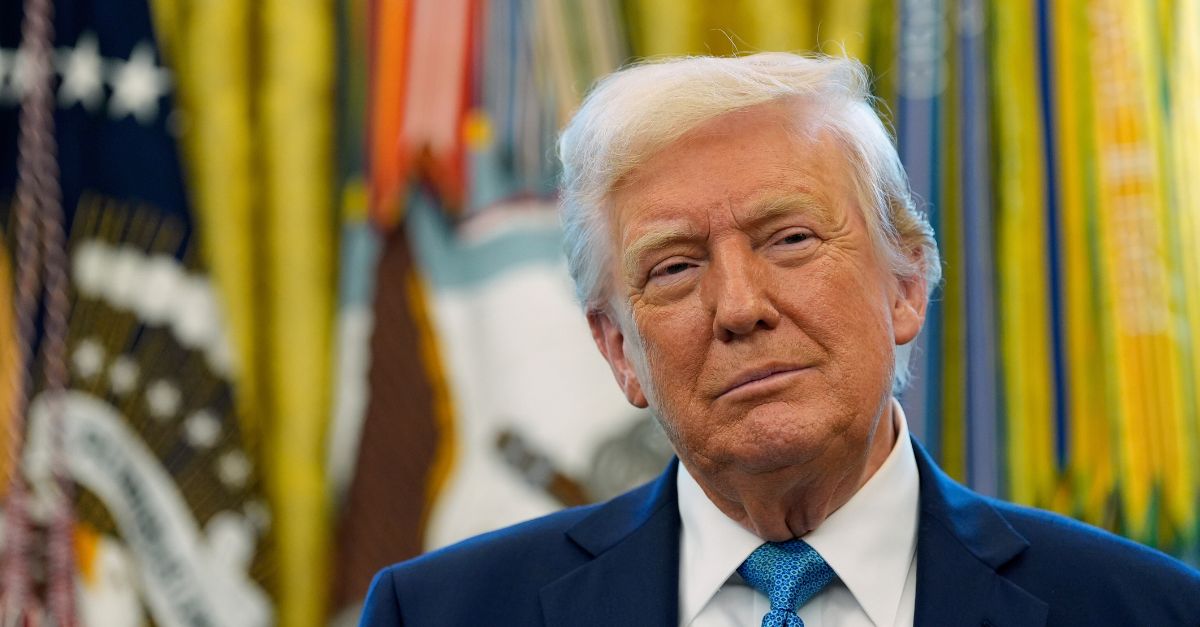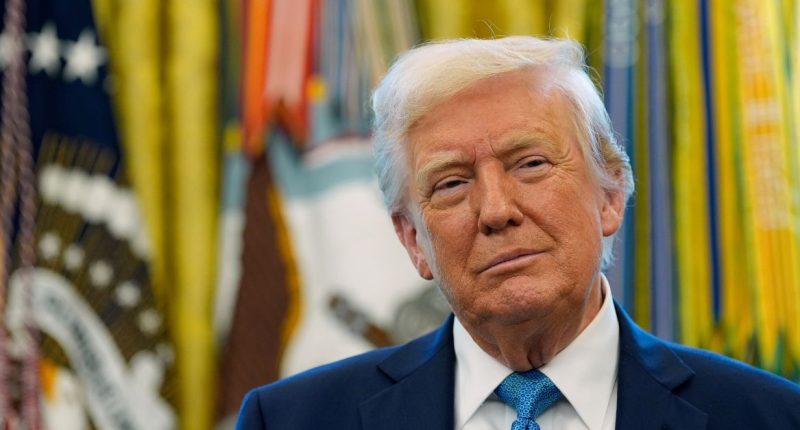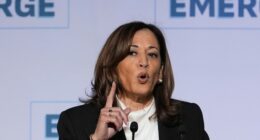
President Donald Trump watches as Treasury Secretary Scott Bessent participates in a ceremonial swearing in of Paul Atkins as chairman of the Securities and Exchange Commission, in the Oval Office of the White House, Tuesday, April 22, 2025, in Washington (AP Photo/Alex Brandon).
President Donald Trump won a relatively quick victory in one of the nation’s lesser-known courts as a panel of New York City judges nixed a request to enjoin the recently-announced worldwide tariff regime.
On April 14, a coalition of businesses filed a 25-page complaint in the U.S. Court of International Trade, calling the tariffs an “unprecedented power grab” while describing the 45th and 47th president’s gripe with trade deficits “a figment of his own imagination.” The litigation sought broad relief — including a temporary restraining order.
On Tuesday, the specialized court — which is empowered to hear all national, and some international, civil disputes over trade-related matters — tersely rejected the request for injunctive relief.
“Upon consideration of Plaintiffs’ Application for a Temporary Restraining Order, Defendants’ response thereto, and all other pertinent papers, and upon a determination that Plaintiffs have not clearly shown a likelihood that immediate and irreparable harm would occur before consideration of their Motion for Preliminary Injunction, it is hereby ORDERED that Plaintiffs’ Application is DENIED,” the three-judge panel ruled.
In the lawsuit, the plaintiffs allege that Trump’s imposition of controversial “Liberation Day” tariffs using the International Emergency Economic Powers Act (IEEPA) and other laws is broadly illegal. The plaintiffs note the IEEPA “does not mention tariffs or duties, or at any point suggest that it is granting the power to lay and collect such.”
In a response motion, the government rubbished this argument as entirely off-base — by citing precedent from the trade court’s earlier iteration in a case concerning the IEEPA’s “predecessor statute.”
“The relevant language in IEEPA authorizes the President to ‘regulate … importation,’ which clearly includes the authority to impose tariffs,” the defendants argued. “Through IEEPA, Congress lawfully delegated to the President authority to regulate importation through the imposition of tariffs under specified circumstances.”
The response offers a quick history lesson:
The history of IEEPA begins with its predecessor, the Trading With the Enemy Act (TWEA). The statute was first intended for use during wartime, but then expanded to apply during times of peace. In 1971, President Nixon invoked TWEA during peacetime to impose tariffs. Specifically, he “declared a national emergency with respect to the balance-of-payments crisis and under that emergency imposed a surcharge on imports.” The Federal Circuit’s predecessor upheld the lawfulness of President Nixon’s TWEA tariffs. After President Nixon invoked TWEA to impose tariffs, Congress passed two new laws modifying the President’s use of emergency powers: the National Emergencies Act and IEEPA.
“Congress separated the President’s authority to act in wartime and peacetime,” the government’s motion goes on. “Congress modified the existing TWEA so that it applied only in periods of declared wars, and adopted IEEPA, which extended the President’s authority to periods of declared national emergencies during peacetime. The broad powers granted to the President under IEEPA are ‘essentially the same as’ those under its predecessor TWEA.”
The lawsuit filed by a libertarian public interest law firm also spends considerable time trying to disabuse the government — and convince the court — over worrying about trade deficits. In any event, the plaintiffs say, such deficits hardly rise to the level of a national emergency.
Here, the Trump administration says the court simply has no say.
“[T]he Federal Circuit has recognized that an inquiry to ‘examine the President’s motives and justifications for declaring a national emergency’ under IEEPA ‘would likely present a nonjusticiable political question,”” the response motion says. “Reviewing the legitimacy of the underlying emergency — a foreign-affairs and national security matter constitutionally and statutorily committed to the President — would require ‘the court to assess the wisdom of the President’s judgment concerning the nature and extent of that threat, a matter not susceptible to judicially manageable standards.’ Thus, the President’s ‘motives, his reasoning, his finding of facts requiring the action, and his judgment, are immune from judicial scrutiny.’ Further, Congress designated itself — not the judiciary — as the body to review emergency declarations and the adequacy of the President’s response.”
Love true crime? Sign up for our newsletter, The Law&Crime Docket, to get the latest real-life crime stories delivered right to your inbox.
While the trade court panel expressly did not address the merits of the underlying litigation, the judges did not think the plaintiffs had done enough to enjoin the tariffs immediately — but they did not rule out an injunction down the line.
To that end, the plaintiffs and the defendants have until April 29, and May 6, respectively, to continue the next steps of motions practice in the case.





